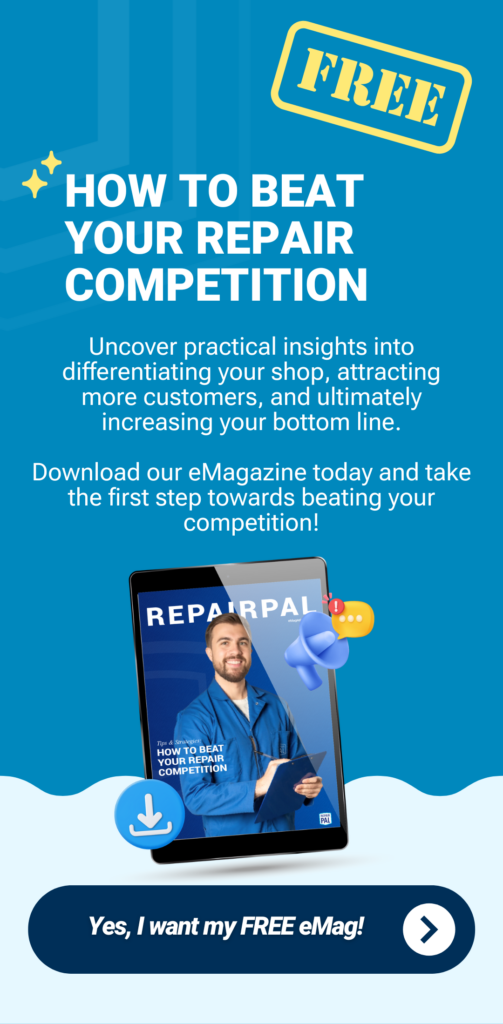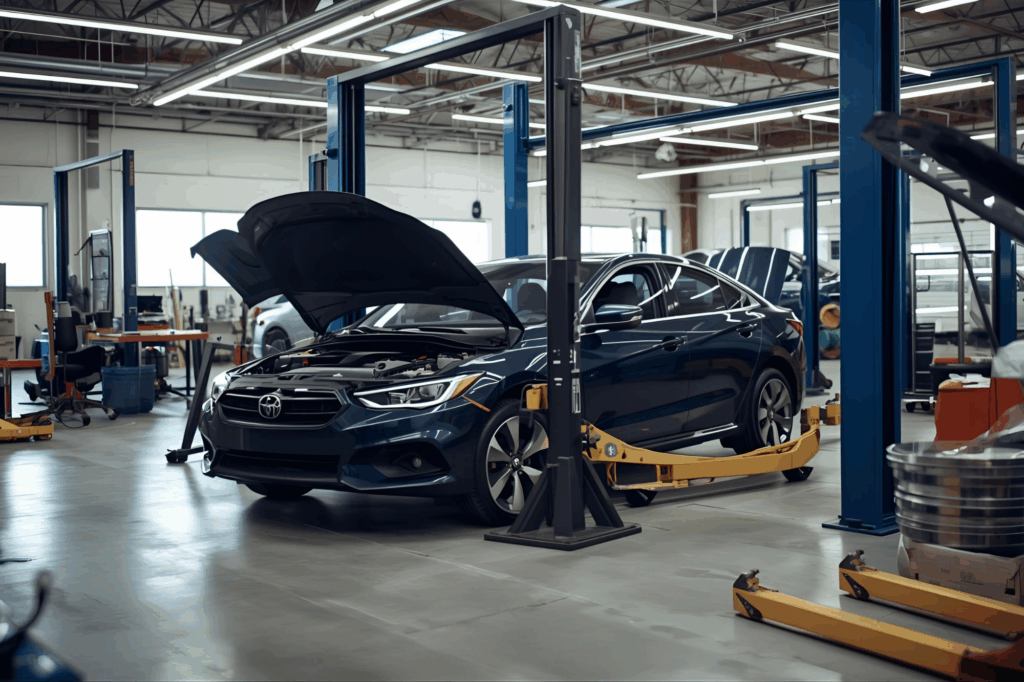Starting an auto repair business can be a rewarding endeavor for aspiring entrepreneurs passionate about cars and mechanics. The auto repair industry offers significant opportunities, but setting up a successful automotive repair shop requires careful planning and execution. This comprehensive guide will walk you through the necessary steps, requirements, and strategies to launch your car repair shop, covering everything from initial planning to the grand opening.
Before You Start: What’s Your Plan for Your Auto Shop?
To open your auto repair shop successfully, it’s important to lay a solid foundation. Consider these factors:
- Market Research: It is important that you understand the geographical area in which you are aiming to open your auto shop. Check out the local competition, demand for auto repair services, and target customer demographics.
- Specialization: Decide whether you’ll offer general auto repair services or specialize in certain models or types of repairs. Specialization can help differentiate your business.
- Permits and Approvals: Research the necessary permits and approvals required in your area. Each state and locality has different regulations.
- Facilities and Equipment: Plan how you will buy the necessary equipment and facilities. Will you lease a space or purchase property? What essential tools and machinery will you need?
- Profitability Path: Outline your path to profitability. Consider your pricing strategy, cost management, and projected revenue streams.
These preliminary steps are necessary to set the stage for a successful business launch.
Your Step-By-Step Guide To Starting an Auto Repair Business
1. Make a Formalized Business Plan
Creating a comprehensive auto repair business plan is the first step. The plan should outline your business goals, target market, services offered, marketing strategies, financial projections, and operational plans. It acts as a roadmap for your business and you need it when seeking financing from investors or lenders.
Action Items:
- Executive Summary: This section should provide a brief overview of your business concept, key objectives, and the strategies you will use to achieve them. It should capture the essence of your business plan and entice readers to learn more.
- Company Description: Detail your business’s mission, vision, and values. Explain what your auto repair shop will do, who you will serve, and what makes your business unique. Highlight your business’s strengths and competitive advantages.
- Market Analysis: Conduct thorough research to understand your industry, market size, target audience, and competition. Identify trends and opportunities within the auto repair industry. Include data and statistics to support your analysis.
- Organization and Management Structure: Outline your business’s organizational structure, including the roles and responsibilities of your management team. Include bios of key team members, emphasizing their experience and expertise in the auto repair industry.
- Services Offered: List and describe the specific auto repair services your shop will provide. Explain any areas of specialization or unique services that will set your business apart from competitors.
- Marketing Strategy: Develop a detailed marketing plan that includes your branding, advertising, and promotional strategies. Decide how you will reach your target audience, like using social media, local ads, or partnering with other businesses.
- Funding Requirements: Determine how much capital you will need to start and run your auto repair business. Outline your funding requirements, including startup costs, working capital, and any additional funds needed for growth and expansion. Specify how you plan to use the funds.
- Financial Projections: Provide detailed financial forecasts for the first three to five years. This should include income statements, balance sheets, and cash flow statements. Include assumptions and explanations for your projections to demonstrate their feasibility.
A good business plan helps you plan your business strategy. It also shows investors and lenders that you have a clear vision and a solid plan for success.
Resource: Check out the U.S. Small Business Administration for more information about how to create a business plan.
2. Legally Incorporate the Company
Choose the appropriate legal structure for your auto repair business, such as a sole proprietorship, partnership, LLC, or corporation. Each structure has different implications for liability, taxes, and regulatory requirements.
- Sole Proprietorship: This is the simplest structure, where you and the business are legally the same entity. Setting up is easy and gives you complete control. However, it also means that you are responsible for any business debts or legal problems.
Partnership: If you’re starting the business with one or more partners, a partnership structure can be beneficial. It allows for shared responsibilities and profits but also means shared liability. You will need a partnership agreement to outline each partner’s role and share of profits. - Limited Liability Company (LLC): An LLC provides a balance between simplicity and protection. It separates your personal assets from business liabilities, offering protection while being relatively easy to manage. It’s a popular choice for small businesses because of its flexibility in management and tax benefits.
- Corporation: Incorporating as a C Corporation or S Corporation creates a separate legal entity from its owners, providing the highest level of personal liability protection. This structure is more complex and has additional rules to follow. However, it can be beneficial for obtaining funding and offering stock options to employees.
Once you decide on the structure, as the shop owner, you need to register your business with the relevant local and state authorities.
Action Items:
- Choose and register a business name.
- Submit the necessary paperwork to the Secretary of State office in your state. This paperwork includes Articles of Incorporation for corporations and Articles of Organization for LLCs.
- Get an EIN from the IRS to pay taxes and hire workers.
- Depending on your state, you might also need to publish a notice of your business formation in a local newspaper.
- Register for state and local taxes and obtain any necessary business licenses and permits.
Resource: Read more about the different types of legal structures for your business from Forbes.
3. Apply for Necessary Licenses and Certifications
Auto repair businesses require specific licenses and certifications to operate legally. Following these laws will help your business follow rules and keep both your business and customers safe. Here’s a detailed look at the types of licenses and certifications you might need:
- General Business License: This is a basic requirement for operating any business. It certifies that you have the authorization to conduct business within your city or county. You can obtain this license from your local city hall or county government office.
- Zoning Permits: Zoning laws regulate the use of land and buildings in specific areas. You must ensure that your auto repair shop is located in an area zoned for commercial use. This might involve submitting plans and getting approval from your local planning department.
- Environmental Permits: Auto repair shops generate hazardous waste such as oil, coolant, and other automotive fluids. You will need to comply with environmental regulations regarding the disposal of these materials. Obtain the necessary permits from your state’s environmental protection agency to handle and dispose of hazardous waste safely.
- Safety Certifications: To ensure the safety of your employees and customers, you must comply with occupational safety and health regulations. The Occupational Safety and Health Administration (OSHA) provides guidelines and certifications for maintaining a safe workplace. Implementing safety measures can also reduce the risk of workplace accidents and liability.
- Sales Tax Permit: If you sell parts or additional services, you will need a sales tax permit. This allows you to collect sales tax from customers and remit it to the state.
- Sign Permit: If you plan to erect a sign for your business, you may need a sign permit. This ensures that your sign complies with local regulations regarding size, placement, and lighting.
Employer Identification Number (EIN): If you plan to hire employees, you will need an EIN from the IRS. This number serves tax purposes and is essential for payroll and employee-related documentation.
Additionally, your auto technicians might need individual certifications:
- ASE Certification: The National Institute for Automotive Service Excellence (ASE) offers certification for automotive professionals. ASE certification is highly regarded in the industry and can enhance your shop’s credibility, although it is not legally required.
- State-Specific Mechanic Licenses: Some states require mechanics to be licensed or certified to work on vehicles. Check with your state’s regulatory agency to determine if this applies to your business.
- Air Conditioning Repair Certification: If your shop will be repairing or servicing automotive air conditioning systems, you may need certification from the Environmental Protection Agency (EPA) to handle refrigerants.
Obtaining the necessary licenses and certifications for your business can be time-consuming. Ensuring that your business is operating in compliance with the law and ethical standards is crucial. Failing to comply with these requirements can result in fines, legal action, or even the closure of your business.
Action Items:
- Research and obtain a general business license.
- Apply for zoning permits and ensure your location complies with local zoning laws.
- Secure environmental permits for the proper disposal of hazardous materials.
- Implement OSHA guidelines and obtain safety certifications.
- Get a sales tax permit if you sell parts or additional services.
- Apply for a sign permit if you plan to put up a business sign.
- Obtain an EIN from the IRS for tax purposes.
- Ensure your mechanics obtain ASE certification or any state-specific licenses required.
- Get certified for air conditioning repair if your shop will handle refrigerants.
Resource: States and cities vary on license and certification requirements. We found StartUp101 to be a helpful resource to find requirements for each state.
4. Secure Financing
Starting an auto repair business requires significant capital investment. Explore various financing options such as small business loans, grants, or personal savings. Prepare your business plan and financial projections to present to potential investors or lenders.
Action Items:
- Research small business loans and grants.
- Prepare your business plan and financial projections.
- Present your plan to potential investors or lenders.
Resource: RepairPal partners with some of the top financial partners in the industry to help support our shop network.
5. Choose a Suitable Location
Selecting the right location is crucial for the success of your auto repair business. Look for a place with high visibility, easy access, and sufficient space for a workshop and customer parking. Consider the cost of rent or purchase, local competition, and proximity to your target market.
6. Purchase Equipment and Tools
Invest in high-quality equipment and tools essential for auto repair services. This includes diagnostic machines, lifts, jacks, air compressors, wrenches, and other specialized tools. Ensure your workshop is well-equipped to handle a variety of repair tasks efficiently.
Action Items:
- Research and purchase diagnostic machines and lifts.
- Acquire jacks, air compressors, wrenches, and other essential tools.
- Set up your workshop to ensure efficient workflow.
7. Hire Qualified Employees
Hiring skilled and certified mechanics is vital to providing quality services and building a good reputation. Look for experienced professionals with ASE certification. Additionally, hire administrative staff to manage customer relations, billing, and inventory.
Determine the number and type of employees you will need based on the size of your shop and the services you plan to offer. Your team may include:
- Automotive Technicians: These are the core of your business. Depending on your specialization, you may need general mechanics, transmission specialists, or engine repair experts.
- Service Advisors: These employees interact with customers, providing estimates, explaining repairs, and ensuring customer satisfaction.
- Administrative Staff: They handle tasks such as scheduling, billing, and inventory management.
- Technicians: They may assist mechanics with simpler tasks, such as oil changes and tire rotations.
Action Items:
- Determine your staffing needs based on the size and services of your shop.
- Write detailed job descriptions and post job openings on various platforms.
- Screen applicants, conduct interviews, and administer skills tests.
- Develop an onboarding and training program for new hires.
- Offer competitive compensation and benefits to attract and retain talent.
- Foster a positive work environment and provide career development opportunities.
- Ensure compliance with employment laws and create an employee handbook.
- Obtain liability insurance to protect your business and employees.
8. Promote and Market Your Shop
Developing a robust marketing strategy is essential to attract customers and build your brand. Here are some effective strategies to promote and market your auto repair shop:
Create a Professional Website
Your website should provide information about your services, pricing, location, and contact details. Include customer testimonials and a blog to engage visitors and improve your search engine ranking.
Leverage Social Media
Using social media can be an underrated way to attract customers to your shop. Social media can help you attract customers. To increase engagement, share interesting content, update your profiles often, and use targeted ads on platforms such as Facebook and Instagram. These ads can help you reach specific groups of people in different areas.
Networking and Partnerships
Building relationships with other local businesses can help increase your visibility and attract new customers. You can team up with nearby car dealerships, auto parts stores, and insurance companies. They can send customers to your shop for repairs.
Additionally, participate in local events, sponsor community activities, and join local and national business associations. By doing so, you will build your reputation and establish valuable connections within the community.
Customer Loyalty Programs
Implementing a customer loyalty program can encourage repeat business and referrals. For example, offer discounts, rewards, or special promotions for loyal customers. This can include free services after a certain number of visits or discounts on future repairs. Moreover, encourage customers to refer friends and family by offering incentives, such as discounts or free services.
Online Reviews and Reputation Management
Positive online reviews can significantly impact your business. Encourage satisfied customers to leave reviews on RepairPal, Google, Yelp, and Facebook. Engage with customers by responding to all reviews to show you value their opinions. Regularly monitor review sites and social media, addressing issues promptly to maintain a positive reputation.
RepairPal Certification
Becoming RepairPal Certified enhances your shop’s credibility and attracts more customers. This certification demonstrates that your shop meets high standards of quality, trust, and fair pricing.
RepairPal offers tools like the Fair Price Estimator to improve your operations and marketing, boosting your online reputation. Additionally, get introduced to new customers through RepairPal.com, the largest site for auto repair, and gain recommendations from partners such as USAA, CarMax, and Consumer Reports.
9. Grand Opening
Plan a grand opening event to introduce your auto repair shop to the community. Offer special discounts and services on the opening day. Invite local media and influencers to create buzz around your business.
How Do You Keep Your Auto Repair Shop Profitable?
Once your auto repair shop is up and running, maintaining profitability becomes the next challenge. Here are some strategies to ensure your business remains profitable:
1. Focus on Customer Service
Providing excellent customer service can lead to repeat business and referrals. Ensure your staff is trained to offer friendly and professional service. Implement a follow-up system to gather customer feedback and address any issues promptly.
2. Efficient Operations
Streamline your operations to reduce costs and increase efficiency. Invest in inventory management software, implement standardized procedures, and maintain a well-organized workshop.
3. Offer a Range of Services
Expanding your service offerings can attract more customers. Consider adding services like vehicle inspections, tire services, or car detailing. Offering maintenance packages can also encourage repeat visits.
4. Effective Marketing
Continuously promote your business through various channels. Use social media to engage with customers, run online ads, and maintain an active online presence. Regularly update your website with promotions and new services. How do you make sure your repair shop stands out from competitors? We have some ideas.
Frequently Asked Questions (FAQ)
How to start an auto repair business?
Starting an auto repair business involves several steps: planning, legal incorporation, securing financing, choosing a location, purchasing equipment, hiring employees, and marketing your shop.
What steps to follow to start the business?
- Create a business plan.
- Legally incorporate your company.
- Apply for necessary licenses and certifications.
- Secure financing.
- Choose a location.
- Purchase equipment and tools.
- Hire qualified employees.
- Promote and market your shop.
What requirements/licenses do I need?
You will need a general business license, zoning permits, environmental permits, safety certifications, and possibly ASE certifications for your mechanics.
Is owning an auto repair business profitable?
Yes, owning an auto repair business can be profitable with proper management, quality service, and effective marketing.
How profitable is an auto repair shop?
An auto repair shop’s profits depend on where it is, its customers, services, and how well it runs day-to-day. On average, a well-managed auto repair shop can achieve a profit margin of 20-30%.
What permits do I need to open a mechanic shop?
You will need a general business license, zoning permits, environmental permits, and safety certifications. You may need additional permits depending on your location.
Do you need a license to be a mechanic?
You don’t need a license to work as a mechanic. However, obtaining certifications such as ASE can enhance your credibility. This can also attract more customers to your business.
How to start a mechanic shop?
Starting a mechanic shop involves planning, securing permits, purchasing equipment, hiring staff, and marketing your business. Follow the step-by-step guide in this article to start.
Ready To Get Started Running an Auto Repair Business?
If you systematically approach it, launching a car repair business can be a rewarding and profitable endeavor. By following the steps outlined in this guide, you’ll be well-equipped to launch and run a successful auto repair shop. For more tips and resources, become RepairPal Certified to get more customers and enhance your shop’s credibility.




